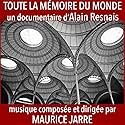VALUTAZIONE IMDb
7,7/10
1621
LA TUA VALUTAZIONE
Aggiungi una trama nella tua linguaThis documentary explores the Bibliothèque Nationale in Paris, its priceless treasures, and how humanity remembers itself.This documentary explores the Bibliothèque Nationale in Paris, its priceless treasures, and how humanity remembers itself.This documentary explores the Bibliothèque Nationale in Paris, its priceless treasures, and how humanity remembers itself.
- Regia
- Sceneggiatura
- Star
Foto
Trama
Lo sapevi?
- ConnessioniEdited into Motherland (2018)
Recensione in evidenza
As an aspiring librarian this film holds natural interest to me. And it's fascinating in its perusal of the work of librarians, the conversion of books, manuscripts, letters et al from disparate beings into objects of the one great whole. The one great whole is the core of the exercise though, the film represents library not just as mind, not just one persons process of drawing in, of classifying and cataloguing knowledge, but that of the whole world. A collective mind then, but not a natural occurrence, an edifice constructed purposefully to forestall the overwhelming force of the great mass of knowledge out there. Camera angles show library workers both as ants and masters, atmospheric controls are likened to the control board of Nemo. In the Nemo reference there is both the notion of obscure mastery, and the literal meaning, nobody. So the library seeks to control and make impersonal the corpus of knowledge so that it may be best used, while in its construction and its workers (each representative of operation of the mind) perhaps controls, makes impersonal the mind itself, making it an idealisation of mind, clear and functional. In some ways it isn't much of a human affair in that there's no passage into the thoughts, minds of librarians themselves, what we are seeing is very much an intellectualised, a lofty and philosophical take. One could take from this that its thoughts are undermined, that what we are seeing is not real experience but one mans speculation, but I think the camera gives it more of a universal appeal. Mostly slow, exploratory, pausing sometimes at what is interesting, when browsing the library bowels it takes on the quality of a human visitor quietly browsing. And the intent score from Maurice Jarre gives it a sense of dynamic, of real human impression. And of course for people not versed in how libraries operate this is a first rate primer in the sort of things they do, it has not even dated much despite factors such as the growth in electronic content (though I'm a little dubious as to whether volumes were ever physically inoculated, I suspect this may just have been a handy metaphor though I'm not certain). Overall its a terrific work I think, considerable merit in its own right and presaging Resnais' later work in its use of physical world as headstate, illustration of mind, its twists and turns and shabby corners. Very much worth a look, 8/10
I più visti
Accedi per valutare e creare un elenco di titoli salvati per ottenere consigli personalizzati
Dettagli
- Tempo di esecuzione21 minuti
- Colore
- Mix di suoni
- Proporzioni
- 1.37 : 1
Contribuisci a questa pagina
Suggerisci una modifica o aggiungi i contenuti mancanti

Divario superiore
By what name was Tutta la memoria del mondo (1956) officially released in Canada in English?
Rispondi













